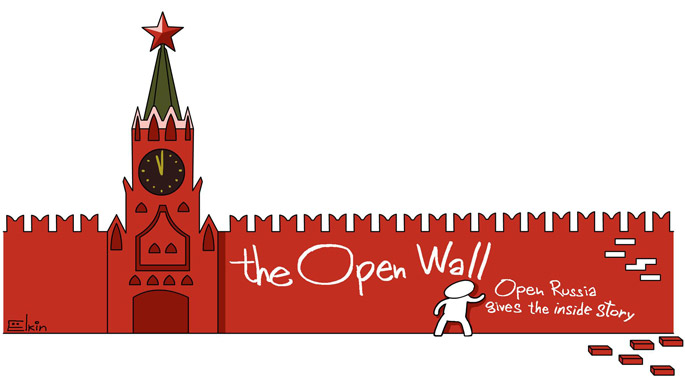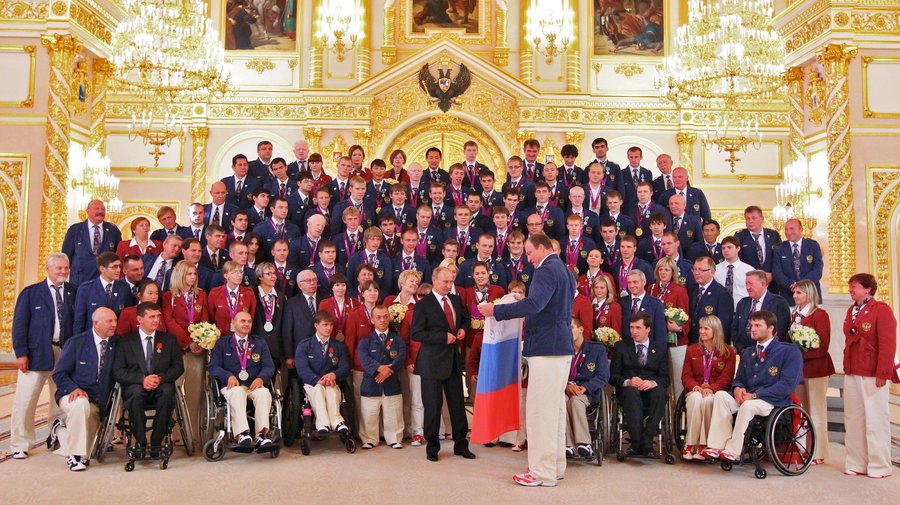Standing up for the disabled

Standing up for the disabled
The Kremlin is seething with righteous rage: Russia’s Paralympians have been barred from Rio.

Sergey Orlov
What’s really getting their goat is that the West has (or so they claim) turned the tables on Russia at the expense of the disabled – the most egregious and inhumane conduct imaginable.
But the vociferous concern for Paralympians’ rights currently being evinced by Russia’s officialdom is, needless to say, politically motivated: the regime has never championed the cause of the country’s 12.7-million-strong disabled population, neglecting to devote even a modicum of attention to the challenges facing disabled people in all but the most extreme – not to say critical – cases.
In June 2016, 75-year-old Krasnoyarsk disabled wheelchair user Vladimir Zhurat armed himself with a sledgehammer and a hammer, and went off to smash up the high kerb blocking his path to the medical centre, a protest at local officials who’d long turned a blind eye. To get the officials to pay attention to his plight, the pensioner was also forced to declare a “dry” hunger strike, swallowing his medication without water for several days.
Although Vladimir was able to shake the officials out of their indifference – they even carried out some kerb improvement works – Igor Kurnosenko, another wheelchair-bound Kransnoyarsk resident, was considerably less lucky. In July 2016, Igor committed suicide because the local authorities refused to install a ramp at the entrance to his building, and he could no longer stand his perpetual imprisonment within four walls. “Everyone was just giving him the runaround. No one was doing anything. There’s no money, they said. Their inaction killed my son,” insists pensioner Galina Zimin. Prime Minister Dmitry Medvedev approved a decree on measures to ensure housing accessibility for people with disabilities on the very same day that Krasnoyarsk television reported Igor Kurnosenko’s death.
More often than not, state officials and people with disabilities exist in totally separate realities –witness the former’s self-congratulatory pronouncements at the First Moscow Congress of Parents with Disabled Children, held in the autumn of 2015: “Today, there are over 53,000 special-needs children enrolled in Moscow’s schools, and more than 20,000 of them suffer from disabilities. […] Today, any child in any school can feel accomplished.” Then Ksenia Alferova, actress and founder of charity I Exist!, which supports children with disabilities, took the stage. “Those sounded like fairy-tale numbers,” she said, to rapturous applause from the thousands-strong audience. No less rapturous was the applause that greeted Nyuta Federmesser, head of the Vera [Faith] Foundation (help for hospices). It pained her beyond words to listen to bravura reports about how good everything was, she said: “When I hear how many special-needs children are enrolled in our schools, I have a question: where does this figure of 57,000 come from? Only one child in our hospice attends school – all the others are doing battle with the Department of Education.”
Over the last two years, the government has miraculously “cured” between 200,000 and 500,000 disabled individuals (estimates vary) by changing the defining criteria of disability. For instance, children suffering from cystic fibrosis, asthma, diabetes, Down’s Syndrome and hearing impairment are no longer deemed to be disabled.
In Russia, the loss of disability status automatically means the cessation of substantial social support: the state ceases to provide the newly “non-disabled” with pensions, benefits, tertiary education and housing subsidies, as well as free medicines and rehabilitation. But it’s not only the defining criteria of disability that have changed of late: specialists conducting socio-medical assessments have also fundamentally altered their approach. According to Anna Litus, head of the Equal Opportunities organisation, these experts are now operating in accordance with “verbal instructions” and doing everything in their power to reduce the number of people with disability status; if they rebel, dismissal awaits.
Kommersant reader Natalia knows what socio-medical assessments mean in practice: “To get an assessment, you need to have been on medical leave for six months, going from doctor to doctor – it doesn’t even matter if you can walk or not. So you turn up to your assessment, and it’s: ‘Come on, chuck away those crutches, have a walkabout on your tiptoes, that’s enough pretending. You’re healthy, I’m deeming you fit to work for the next year’ – this to a person with a broken spine, a person who uses a mobility walker.’”
Sergei Smirnov, director of the Institute of Social Policy at the Higher School of Economics in Moscow, says that the government has actively begun to cut costs when it comes to disability funding: “They’ve found a domain where costs can be cut without changing any legislation. Social funding is being cut across the board.”
Challenging an unfair socio-medical assessment in court will no longer be possible either. “The courts have been given firm instructions on dealing with such disputes when budget funds are at stake,” says Svetlana Danilova, head of the Novosibirsk Centre for Independent Medical and Social Assessments. “A judge recently told me in no uncertain terms that if disabled claimants received one hundred percent compensation, the state would have nothing left.”
The Paralympic Games have always represented a means of drawing attention to the needs of people with disabilities. Today, however, Russia seems to have an entirely different goal: with disabled Russians consigned to the fringes of public attention, the Paralympics has become yet another international arena in which the Kremlin wants to cast itself as the victim – and to do so at any cost. There is little sporting and humanitarian intent to speak of here.



